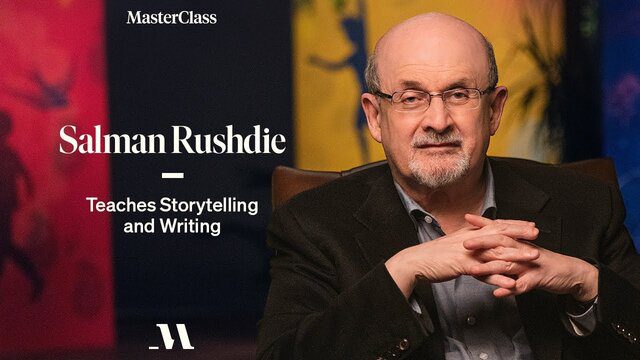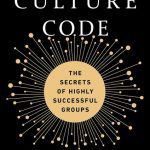‘Happiness writes in white ink on a white page.’ – Henry De Montherlant
Booker Prize winner Salman Rushdie teaches his techniques for crafting believable characters, vivid worlds, and spellbinding stories. Salman is a British Indian novelist and Essayist whose work combines magical realism with historical fiction. His story has many connections, disruptions, and migrations between Eastern and Western civilizations, with much of his fiction being set on the Indian subcontinent.
Humble Beginning
In the ’70s, he got a job whipping up advertising copy for an agency in London. During long weekends and days off, he labored on his first novel, Grimus. The book garnered little in the way of acclaim upon its release in 1975. But five years later, on his second try, the young author struck gold: Midnight’s Children, a staggeringly original parable exploring India’s independence and identity, won the prestigious Booker Prize for Fiction. The tome cemented what’s become one of Salman’s trademark techniques: riffing on sacred texts and religious figures and revealing their uncomfortable truths and contradictions through satire.
Today, he occupies a rare space in modern society, a legitimate canon author whose expansive social circle includes celebrity friends, from Courtney Love to Diane von Furstenberg. He lives in New York, where he continues to teach and write, and is now Sir Salman Rushdie, knighted by Queen Elizabeth II in 2007 for his services to literature
Some stories are not true, but by being untrue, they can make you feel and know truths that the truth could not.
The Opening Line
As Catch-22 author Joseph Heller told Salman: Most books grow from a single sentence. When writing your first line, think: What type of novel is this? A comedy? An epic? A thriller? The opening can be grand, simple, contradictory, assertive. But it should propose a contract to the reader: If you keep going, I’ll tell you a certain kind of story.
Open Sentences in Great Literature
- Toni Morrisson Beloved: 124 was beloved
- Leo Tolstoy‘s 1877 novel Anna Karenina: All happy families are alike; each unhappy family is unhappy in its own way.
- A Tale of Two Cities (1859) – French Revolution
It was the best of times, it was the worst of times, it was the age of wisdom, it was the age of foolishness, it was the epoch of belief, it was the epoch of incredulity, it was the season of Light, it was the season of Darkness, it was the spring of hope, it was the winter of despair…
“The novel is a prose narrative of some length that has something wrong with it.” – Randall Jarrell
KEEP YOUR INFLUENCES, KILL YOUR DARLINGS
Every author, from Jane Austen to Jhumpa Lahiri, must devise a personal process for self-editing. The finer points aren’t so important as the approach: An open mind and honest perspective are key. You may need to eliminate a character, discard a whole subplot, even change the major storyline. Don’t feel bad; it’s all part of the writer’s journey. And, more often than not, it’s an indicator of progress.
Ask yourself six questions:
- Whose story are you telling?
- What’s the story?
- Why are you telling the story?
- When does the story take place?
- Where does the story take place?
- How will you tell the story?
Write your self a letter
Write yourself a letter about the book you are writing, pretend the letter is written to a friend who is then asking you what the book is about, who are the character. Imagine you are telling it to someone orally. See if you have got something people would be willing to listen to.
Build a Skeleton through a Plot
The plot and structure are the skeleton and the characters and events are the flesh you put into the skin.
The plot and structure are the skeleton and the characters and events are the flesh you put into the skin.
Allow your story to Unfold
The act of a story : the beginning, middle and end is not necessary. It should not be used rigidly, you can let the story unfold, you can start from anywhere from the end and build it up to the beginning.
- Who’s doing what to whom?
- Try a Mirroring Device
Something happening here is like something happening in another place. - Embrace False Starts
- Listen to the Story
- Use Oral Techniques in your writing
- Add a storyteller to your story – First-person narration
Character
- Start from a version of yourself
- Think of your character as real people
- Consider a character biography
- You should never write history until you know how the characters speak
Reveal your Characters through:
- Dialogue
- Interior Monologue
- Action
‘The most essential gift for a good writer is a built-in, shockproof, shit detector.’ – Ernest Hemingway,
Magical realism
Magical realism, a literary genre in which fantastical characters and events are set against a realistic backdrop. This contrast can supply potent narrative tension or, when used expertly, point at larger ideas: escapism and survival, humor and horror, isolation and connection, the relative nature of absurdity, and the multiplicity of contradictions therein.
In the magical realist novel, inanimate objects speak, people fly, ghosts consort with the living. But this isn’t fantasy or science fiction. Elements of magic are situated in a setting that feels familiar and natural to the reader— within a place, culture, or historical moment that actually existed—so the fantastical feels almost plausible.
Listen to the Rhytm of the speech
- Develop believable dialogue
- Practice differentiating characters
- Consider the relationship between place and time.
- Create a vision of a place
- Examine your life ruthlessly
- Increase what you know – Be sure what you know is interesting
- Make the unfamiliar famiiar
- Go on a walking adventure
Seven useful tips for writers
- Figure out if you are a minimalist or a maximalist
- Figure out if you are a planner.
- Write what feels deeply necessary to you
- Work close to the Bull (Take Risk)
- Commit the seat of your pants to the chair
- Discard what is not working
- Writers are people who finish books
Salman’s Books
Grimus (Novel) – 1975
A work of science fiction in which an immor tal man makes a mythological journey to regain the gift of mortality
Midnight’s Children (Novel) – 1981
A modern masterpiece that charts the trials, tribulations, and magical powers of a group of children born in 1947, at the precise moment India became independent from Britain
Shame (Novel) – 1983
An allegorical commentary on Pakistani society that chronicles two families and their patriarchs—one infatuated with war, the other obsessed with pleasure.
The Jaguar Smile – 1987
A novelistic account of Salman’s trip to Nicaragua following the international controversy between the Sandinistas and various world powers
The Satanic Verses (Novel) -1988
An epic tale of two men whose lives take on mythological qualities after enduring a surreal terrorist attack aboard a jet from India to Britain
Haroun and the Sea of Stories -1990
Dedicated to Salman’s son, this is in many ways a children’s version of his fictionalized critiques of religious intolerance
Imaginary Homelands – 1991
A collection of essays written between 1981 and 1991 that explores the manufacturing of identity in the globalized age
East, West -1994
A collection of stories that explores many of the East-meets-West culture clashes the author has navigated in real life
The Moor’s Last Sigh – 1995
The story of a spice trader, who ages twice as fast as normal humans, and his relationships with the women in his life
The Ground Beneath Her Feet -1999
A retelling of the myth of Orpheus and Eurydice that simultaneously examines the history of rock music
Fury -2001
A Brit of Indian descent abandons his family and flees to New York in a darkly comedic plot that probes the corrupting effects of anger, wealth, and globalization
Step Across This Line -2002
This collection of essays, speeches, and opinion pieces, written between 1992 and 2002, focuses on Salman’s period of hiding in the wake of The Satanic Verses and the world events that transpired around it
The Enchantress of Florence -2008
Machiavelli is among the characters in a work of historical fiction that constantly ebbs in and out of fantasy as it moves back and forth from Italy to India
Luka and the Fire of Life -2010
A sequel to his first children’s book that inhabits a similarly fantastical world (this time inspired by video games) as the main character seeks a sort of Holy Grail that he hopes will revive his ailing father
Joseph Anton -2012
The full story of the fallout from The Satanic Verses controversy, this memoir chronicles Salman’s time spent writing and navigating romance and fatherhood while under police protection
Two Years Eight Months and Twenty-Eight Nights -2015
Centered on a family of jinns (genies), this phantasmagoric tale features Ibn Rushd, a famous Islamic philosopher and Salman’s family’s namesake
The Golden House -2017
This contemporary realist parable chronicles a wealthy and exceedingly strange Manhattan family, and nods at the real-life drama unfolding in America as Donald Trump rises to power
Quichotte -2019
Inspired by Don Quixote, the metafictional plot of Salman’s most recent book involves an Indian American man and a celebrity television host
MasterClass is a streaming platform that makes it possible for anyone to learn from the very best. MasterClass is an online membership – accessible on your phone, web, Apple TV, Roku devices, and Amazon Fire TV – that offers classes on a wide variety of topics taught by 90+ world-class masters at the top of their fields.
Their immersive learning experiences combine incredible video content, downloadable materials, and social interaction with the MasterClass community, all of which users can explore at their own pace.
The annual membership is available for $180 USD, which allows unlimited access to ALL on demand MasterClass content for the year
Give One Annual Membership. Get One Free.
All the best in your quest to get better. Don’t Settle: Live with Passion.
For More Information: MasterClass Home Page





1 Comment
Pingback: Lessons Learned from N. K. Jemisin’s Masterclass Session on Fantasy and Science Fiction Writing. – Lanre Dahunsi